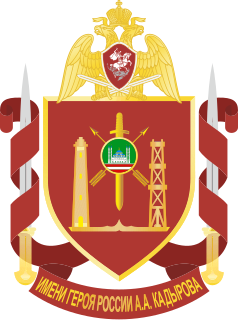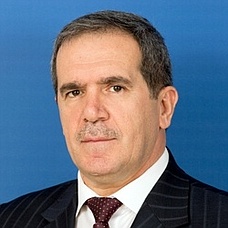
Chechnya, officially the Chechen Republic, is a republic of Russia. It is situated in the North Caucasus of Eastern Europe, close to the Caspian Sea. The republic forms a part of the North Caucasian Federal District, and shares land borders with the country of Georgia to its south; with the Russian republics of Dagestan, Ingushetia, and North Ossetia-Alania to its east, north, and west; and with Stavropol Krai to its northwest.

Grozny, also spelled Groznyy, is the capital city of Chechnya.
Akhmed Halidovich Zakayev is a former Deputy Prime Minister and Prime Minister of the unrecognised Chechen Republic of Ichkeria (ChRI). He was also the Foreign Minister of the Ichkerian government, appointed by Aslan Maskhadov shortly after his 1997 election, and again in 2006 by Abdul Halim Sadulayev. During the First Chechen War, Zakayev took part in the battles for Grozny and other military operations, as well as in high-level negotiations with the Russian side.

Akhmad-Khadzhi Abdulkhamidovich Kadyrov was a Russian politician and revolutionary who served as Chief Mufti of the Chechen Republic of Ichkeria in the 1990s during and after the First Chechen War. At the outbreak of the Second Chechen War he switched sides, offering his service to the Russian government, and later became the President of the Chechen Republic from 5 October 2003, acting as head of administration since July 2000.
The history of Chechnya may refer to the history of the Chechens, of their land Chechnya, or of the land of Ichkeria.

According to its constitution, the Russian Federation is divided into 89 federal subjects, 24 of which are republics. Republics are administrative divisions originally created as nation states to represent areas of non-Russian ethnicity. The indigenous ethnic group that gives its name to the republic is referred to as the titular nationality. However, due to centuries of Russian migration, each nationality is not necessarily a majority of a republic's population.

Ramzan Akhmadovich Kadyrov is a Russian and Chechen politician who currently serves as the Head of the Chechen Republic. He was formerly a member of the Chechen independence movement, and is a colonel general in the Russian military.

Dzhokhar Musayevich Dudayev was a Soviet Air Force general and Chechen separatist leader, the first president of the Chechen Republic of Ichkeria, a breakaway region in the North Caucasus, from 1991 to his assassination in 1996.

The Chechen Republic of Ichkeria was a de facto state that controlled most of the former Checheno-Ingush ASSR. On 30 November 1991, a referendum was held in Ingushetia in which the results dictated its separation from the Chechen Republic of Ichkeria, joining the Russian Federation instead as a constituent republic.

Doku Khamatovich Umarov, also known as Dokka Umarov as well as by his Arabized name of Dokka Abu Umar, was a Chechen mujahid in North Caucasus. Umarov was a major military figure in both wars in Chechnya during the 1990s and 2000s, before becoming the leader of the greater insurgency in the North Caucasus. He was active mostly in south-western Chechnya, near and across the borders with Ingushetia and Georgia.

The 141st Special Motorized Regiment, also known as the Kadyrovites and the Kadyrovtsy, after Akhmad-Khadzhi Kadyrov, is a paramilitary organization in Chechnya, Russia, that serves as the protection of the Head of the Chechen Republic. The term Kadyrovtsy is commonly used in Chechnya to refer to any armed, ethnically-Chechen men under the control of Head of the Chechen Republic Ramzan Kadyrov - although nominally they are under the umbrella of the National Guard of Russia.

The Republic of Chechnya is a constituent republic, a federal subject of the Russian Federation. It is located in the Caucasus region in south west Russia. It is the political successor of the Checheno-Ingush Autonomous Soviet Socialist Republic. From a centralized form of government during the existence of the Soviet Union, the republic's political system went upheavals during the 1990s with the unrecognized establishment of the Chechen Republic of Ichkeria which led to the wars, the First Chechen War and the Second Chechen War which left the republic in total devastation. In 2000, following Russia's renewed rule, a local, republican form of government was established in the republic under the control of the Russian federal government.

The Act of Declaration of Independence of Ukraine was adopted by the Supreme Soviet of the Ukrainian SSR on 24 August 1991. The Act reestablished Ukraine's state independence.
Relations and contacts between Estonia and Ichkeria have historically been, and are, very friendly due to the two peoples having similar experiences and perceiving a common foe, be it Russian Empire, the Soviet Union or the modern Russian Federation. The Estonian people and the Chechen people, in addition to actively helping the others' covert activities against Moscow, have at various times borrowed tactics and ideologies from each other.
The 2010 Chechen Parliament attack took place on the morning of 19 October 2010, when three Chechen militants attacked the parliament complex in Grozny, the capital of the Chechen Republic, a federal subject of Russia. At least six people were killed, including two police officers, one parliament employee and all three suicide commandos.

The Chechen–Russian conflict was the centuries-long conflict, often armed, between the Russian government and various Chechen forces. The recent phase of the conflict started after the disintegration of the Soviet Union in 1991 and lasted until 2017.

The coat of arms of the Chechen Republic is the official symbol of the Chechen Republic. Approved by acting President of Chechnya Sergey Abramov on 22 June 2004.
Mamihan Umarov was an Austrian blogger of Chechen origin, also known as Anzor from Vienna; political emigrant. He was known as an ardent opponent and critic of Ramzan Kadyrov's activities as head of the Chechen Republic in Russia. On July 4, 2020, he was shot and killed in Vienna by a Russian agent.

The Chechen Republic, commonly known as Chechnya, is a federal republic of Russia that has been noted in several roles during the 2022 Russian invasion of Ukraine. Kadyrovite forces have fought alongside the Russian forces, while the Dzhokhar Dudayev Battalion and the Sheikh Mansur Battalion have fought on the Ukrainian side. International observers have noted a number of comparisons between the invasion and the First and Second Chechen Wars.

Ziyad Mukhamedovich Sabsabi, is a Syrian-Russian politician who served as a Member of the Federation Council from the legislative authority of the Chechen Republic from 2008 to 2019.















